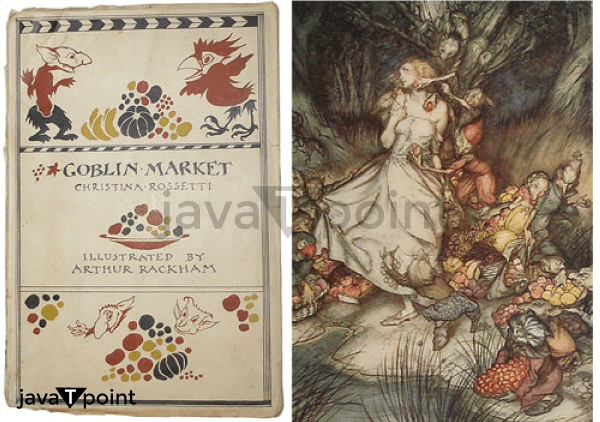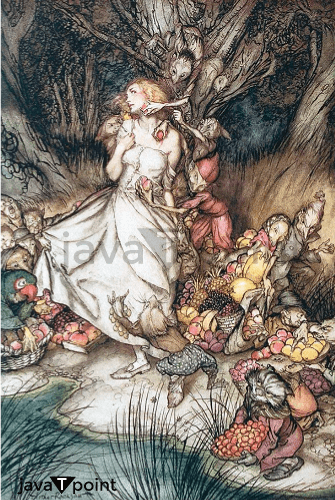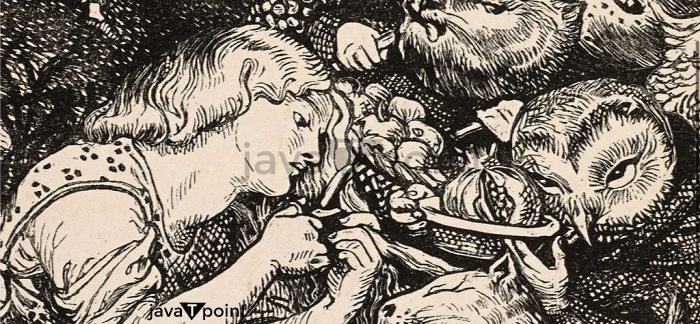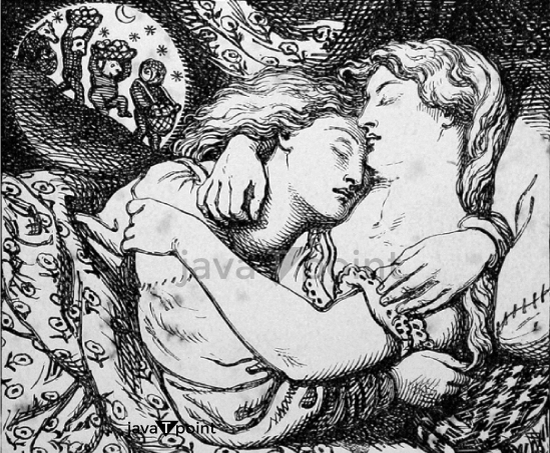Goblin Market SummaryIntroductionChristina Rossetti's "Goblin Market" is a narrative poem. The poem is distinguished by its rigid ethical standards and stress on conventional ideals. It was first issued in 1862, during the Victorian era. It tells a narrative with characters, a story, and a distinct timeline. Laura and Lizzie's encounters as they come into contact with the goblin traders and their alluring fruits are recounted in the poem, which has a sequential narrative framework. The poem's narrative structure enables the investigation of various issues and the ongoing growth of characters. 
The poem is divided into two sections, each having its narrative flow. The goblin traders and their delectable fruits are introduced in the first section, which Laura can't resist. She eats prohibited fruits, weakening and making her sick. The poem's second section describes Lizzie's efforts to rescue her sister by purchasing the fruits from the goblin traders and taking them to her sister Laura for her to snack on. Background of the PoemMany prevailing traditions were questioned in Rossetti's work, particularly in examining feminine sensuality and want. Rossetti may have been inspired to write this poem to question and disrupt social standards, especially women's duties and wants. Women were under intense pressure to uphold the Victorian ideals of virtue and decency. In "Goblin Market," Rossetti may have wished to challenge these constrictive norms and present a more complex picture of women's experiences by focusing on elements of desire, temptation, and female autonomy. Her childhood and religious convictions also inspired Rossetti. She was raised in a devoted Anglican family, and religious themes may be seen in her writings. In "Goblin Market," religious images and themes of atonement and sacrifice are woven throughout the story. Rossetti might have been inspired to investigate sin, atonement, and deliverance through the poem's metaphorical structure. Moreover, Rossetti's work was probably influenced by her problems and difficulties. She had a difficult love life and had been rejected and disappointed numerous times. These unique circumstances could have impacted how she explored desire, longing, and the negative effects of indulging in "Goblin Market." Remember that authors' reasons can be complex and impacted by various personal, social, and aesthetic variables. While there are a few reasons why Rossetti might have written "Goblin Market," the writer herself might only be aware of her genuine influences and driving forces. The Theme of The Poem"Goblin Market" explores female sexuality and desire as one of its main themes. The poem explores the repercussions of giving in to such cravings and uses the goblin fruit as a metaphor for sexual seduction. It is possible to interpret Laura's initial attraction to the fruits and her eventual desire for more as a metaphor for feelings of sexuality and discovery. But her acts are shown to affect her well-being negatively, and she eventually needs her sister's help to turn things around. The poem also depicts the goblin men as charming and cunning characters. They deploy enticing tunes, seductive words, and other strategies to seduce the women. Their behavior can be interpreted as a critique of social norms and a warning against giving in to outside pressure. There is also religious imagery and symbolic meaning used frequently in the poem. Christian ideas of salvation and redemption are alluded to in the restorative power of Lizzie's sacrifice for her sister. The poem emphasizes the value of giving to others and the possibility of finding salvation through deeds of compassion and sacrifice. Rossetti's strong sensory representations and in-depth descriptions enhance the poem's charming and seductive mood. The readers' senses are stimulated, and the imagery of the goblin fruits creates a great temptation as "juicy plums" and "luscious pears" on the page. The attractiveness of enticement and its results are further highlighted by the distinction between the colorful, alluring fruits and the pale, withering Laura. The poem's repetition and rhymes and its repetitive and melodic components add to its lyrical and hypnotic aspects. The goblin men's calls have a mesmerizing effect that is enhanced by repetition, such as the refrain "Come buy, come buy," which also instills a sense of desperation and want. The real charm and magic of the poem are enhanced by its melody. Additionally, "Goblin Market" can be seen as a feminist work that emphasizes the value of female agency, sisterhood, and defying social norms. The sisterly tie between Laura and Lizzie is shown to be strong and unbreakable, with Lizzie assuming the duty of being her sister's savior. The poem questions conventional gender norms by presenting women as independent decision-makers who can act to save themselves. Overall, "Goblin Market" is a complicated, multifaceted poem that uses a variety of literary approaches to explore different ideas. Christina Rossetti's poem continues to enthrall readers with its rich metaphors, moral precepts, and study of desire, temptation, and redemption. It also challenges us to think about the complexity of the human condition and the strength of love and sacrifice. SummaryThe poem's opening lines describe the blissful lives of Laura and Lizzie, who stay together in a house and have a close bond. They are right away intrigued to purchase the fruits when they hear the shouts of the goblin men selling them, but they withstand the impulse. Laura begins to become more curious, though, and she eats the goblin fruit. Laura enters the goblin market to eat the delectable fruit and trades a strand of her hair. Laura enters an overwhelming feeling of euphoria and satisfaction due to her rash decision. She is, however, devoured over time by an uncontrollable need for the goblin fruit, which is no more accessible. Her fascination with the fruit impacts Laura's psychological and physical well-being. She deteriorates, turning pale and frail, and succumbs to illness, causing much to the anguish of her sister Lizzie. 
Lizzie approaches the goblin men out of concern for her sister's safety and to free Laura from her obsession. She declines their enticements and demands to purchase the fruit with a "golden curl." Lizzie fights off the goblins' attempts to ram the fruit into her mouth as they become angry. Lizzie informs Laura about her experience when she comes back. Laura attempts to embrace Lizzie's face to get some of the fruit's flavor, but it doesn't satisfy her. Due to her craving for the goblin fruit, Laura grows sick and frail. Lizzie decides to act independently and returns to the goblin market for a remedy for her sister. When the goblin men attempt to coerce Lizzie into eating the fruit, she has to bear their anger. She fights them off and makes off with a vial of fruit juice. She dashes back to Laura and says that to be healed; Laura must consume the juice. Laura is reluctant to drink the juice, but she eventually does, and magically her health returns. The juice's curative qualities stand in for redemption, the potential to resist temptation, and its negative effects. After their encounter, Laura and Lizzie swear never to mention the goblin market or its products again, showing their determination to put the temptations of the past behind them. Their experiences change them, making them virtue- and religion-filled ladies. The poem ends with a more general theme. Laura and Lizzie warn young maidens about the perils of temptation and the results of giving in to forbidden desires. Their experience serves as a lesson for others, emphasizing the value of self-control, sisterly love, and restraining oneself from temptation. The metaphor and symbolism of "Goblin Market" are abundant. The goblin fruit is a metaphor for sensual and materialistic wants, and Laura eating it represents giving in to persuasion. On the other hand, Lizzie stands for virtue and selflessness because she gives her life to save her sister. Detailed AnalysisThe goblins' origin and motivation for preying on women are not revealed. They are merely an element of the picturesque, unnamed rural setting in which the poem is set, and they appear to exist solely to entice young women to purchase and consume their fruit. The goblins' descriptions of their fruit are overtly sexual and imply ripeness and sexual attraction. The enticing rhetoric the goblins use is meant to entice ladies by inspiring them to picture the joy of partaking in their fruit. Although it isn't apparent why the goblins are so hazardous at the poem's beginning, both sisters instantly perceive that the goblins are a sexual menace. In the second stanza, Rossetti uses language to emphasize the sisters' physical reaction to the goblins. The sisters' "tingling cheeks and fingertips" and Lizzie's urge to lower her head and hide her blushes both indicate that they are being titillated or sexually aroused by their interactions with the goblins. They are both afraid and curious, and many Victorians thought that women should avoid sexually curious males. By observing the goblins, Lizzie tries to save her sister from putting herself in danger. But Laura's desire appears too strong a temptation, and she tempts Lizzie to look at the goblins in addition to herself. Laura is originally terrified by the unusual character of the fruit, but she is now intrigued by it; this plays into European beliefs that non-Europeans, especially those from colonized countries, are primitive, immoral, and overtly sexual. Laura is going beyond the limits of what is considered appropriate behavior for women at the time by resisting temptation and satiating her sexual desire. In addition to being afraid of the goblins and the implications of eating their fruit, Lizzie also fears the intensity of her sexual curiosity and need, as shown by the "tingling cheeks and fingertips." Such emotions were usually regarded as improper and unwomanly. Lizzie walks away from her sister due to her extreme fear. Because of their likeness to animals in the poem, goblins are thought to be uncontrolled, ferocious, and dangerous. Some creatures, like the cat, are common yet clearly predatory and may indicate that the goblins want to use young women as prey. Laura loses her self-control, which causes her to be wary of the goblin men. It is portrayed as a place where she can no longer turn around, anticipating her ultimate metaphorical "fall" after eating the forbidden fruit. The goblins' slyness implies that they want to mislead or deceive Laura in a certain way, and the term "leer," which means to look at someone offensively and lustfully, emphasizes the sexual nature of their ruse. The goblins work together to seduce Laura by offering her their delectable fruit on a golden platter and making her a crown as a present. They recognize that Laura's decision to linger indicates that she is interested in them and their fruit and will be open to their arguments. The goblins try to charm, flatter, and convince Laura to accept their fruit. The fact that Laura has concerns about her financial situation is important. Perhaps she does not want to owe them anything due to the goblins' bad reputations or because accepting a gift from a dangerous (goblin) man seems impolite. In addition, she is typically portrayed as a pure and honorable woman who thinks taking the fruit without paying is dishonorable. The goblins get Laura to cut a strand of her hair to present in compensation after rejecting her explanations for not eating the fruit. By doing this, the goblins metaphorically turn Laura's hair into a product with worth. She essentially sacrifices herself to obtain the forbidden fruit, equating her with the fallen lady of Victorian culture. The combination of biblical allusions with Laura's physical delight of the fruit?which she "sucked until her lips were sore"?is striking. The expressions "man-rejoicing wine" and "honey from the rock" relate to God's provision of goodness for his obedient followers. The fact that the goblin fruit seems better than the wine and tastier than the honey shows that its sweetness is a deception and that Laura is being led away from God by accepting and liking it. 
The fruit of the goblins alters Laura's perception. Her confusion and lack of knowledge of her surroundings foretell the fear, sadness, and forgetfulness she will feel due to her obsession with the lethal fruit. Lizzie's reprimanding is ineffective because the fruit has already tainted Laura's psyche and ruined her tranquillity. The audience is given proof of the goblins' deadly consequences on women. Laura's likely outcome is hinted at by Lizzie's warning of Jeanie, who ate their fruit, was left behind, and passed away in her prime. The narrative of Jeanie can also be interpreted symbolically; it follows a typical course for fallen women in Victorian literature and art, in which they undergo a sexual "fall," are deserted by their seducers, and ultimately perish. The goblins have robbed Jeanie of possibilities for marriage and motherhood, which the Victorians considered the ideal, as evidenced by the lack of her grave, on which no greenery would grow. Christina also makes the reader aware of Laura's danger because she still craves the fruit even after eating it a lot. The sensual words Laura employs to describe the fruit to Lizzie are also significant. Laura tries to entice Lizzie by offering her food, as though speaking in the goblins' dialect. Laura develops an obsession with the goblin fruit that she can no more purchase later in the poem. The sisters are interchangeably depicted as lying in the same bed, using imagery that highlights their innocence, purity, and innate worth. It is significant because so-called fallen women were frequently regarded as dirty and tainted in nineteenth-century thinking. Rossetti rejects this idea. Laura is devastated to learn that she cannot hear the goblin men's call and cannot purchase their fruit. The goblins walked away from Laura after giving her a tempting taste of their cursed fruit, just like they did with Jeanie. Lizzie may have already told Laura about the goblins, but it's also possible that Laura hides her misery from her because she feels ashamed of the intensity of her longing. Once more, Laura embodies the Victorian cultural concept of the fallen lady, who is frequently shown as being overwhelmed by sorrow and despair, particularly after being abandoned by her seducer. Laura's heart is broken without the goblin fruit. Like Jeanie's, her once-golden hair has changed, becoming frail and grey like an older woman. In addition to being an extension of who she is, Laura's hair also conveys information about her mental, emotional, and physical well-being or lack thereof. Moreover, Laura's inability to produce more fruit implies that she has somehow lost the ability to support life. If the goblins' exotic fruit symbolizes a longing for things considered taboo for women at the period, it also renders Laura incapable of surviving in her formerly routine function as a household woman. After witnessing her sister's suffering, cautious Lizzie chooses to go to the goblins at dusk to buy fruit for Laura despite her doubts about them and the potential repercussions of doing so. Lizzie shows that she is more cautious and conscious of the goblins' threat than Laura is by placing a silver penny in her purse to utilize as payment for this act of sisterly self-sacrifice. The goblins feel Lizzie is gullible enough to fall for their enticing sales pitch. They entice her by telling her about their fruit in a sexually explicit manner and encouraging her to picture how it would taste and feel on her tongue. However, Lizzie declines their offers and instead attempts to buy the fruit, offering them a silver cent in exchange. Lizzie's resolve to use cash to purchase the fruit is significant. The goblins shift their strategy and turn violent and brutal when they realize they cannot charm or convince Lizzie to eat of her own free choice. They beat Lizzie's body and try to shove food in her mouth in an act that strongly resembles a sexual assault or attempted rape. Lizzie is extensively depicted in the poem, utilizing imagery representing power, purity, and moral righteousness in the face of difficulty and peril. Of her white skin, golden hair, and inherent purity, she is compared to "a royal virgin town" with a "gilded dome and spire," which also seems to identify her with Christian cities facing attack by invading forces. Laura's state of confusion after first encountering the goblins and tasting their fruit is mirrored by Lizzie's confusion. This mirroring or reproduction of experiences, which may seem like a small point, is important because it implies that Lizzie's sacrifice will negate or reverse the harm her sister suffered from eating the fruit, returning them to the beautiful, tranquil life they had before. Given the poem's numerous biblical allusions, it is also feasible to interpret this moment of mirroring as a reference to the conventional Christian belief that Mary was the second Eve who undid the curses that the first Eve inflicted on humanity by disobeying God. Lizzie's admonition to Laura to "eat me, drink me, and love me" further highlights her Christlike nature. It is reminiscent of Christ's words to his disciples at the Last Supper when he instructed them to consume his body and blood. 
The fruit fluids from her sister's bruised body, which Laura "kissed and kissed" "with a hungry mouth," helped her to get better. This Christ-like act of self-sacrifice by Lizzie results in a miraculous moment of healing that is also sexual in nature and homoerotic, showing that the poem is amenable to interpretations that go beyond simple interpretations as a religious allegory or fairytale. When Laura and Lizzie wake up in the morning, they discover that Laura has returned to health and vigor; Laura's life, which had appeared to be in danger, has metaphorically dawned once more. ConclusionThe moral message of the poem is that giving in to temptation has a high price. Although Laura's trauma has left scars, Lizzie's goodness and selflessness enable her to save her sister. The story "Goblin Market" might be seen as a warning about the perils of giving in to desire and the rehabilitative power of love and sisterhood.
Next TopicHope is the Thing with Feathers Summary
|
 For Videos Join Our Youtube Channel: Join Now
For Videos Join Our Youtube Channel: Join Now
Feedback
- Send your Feedback to [email protected]
Help Others, Please Share









